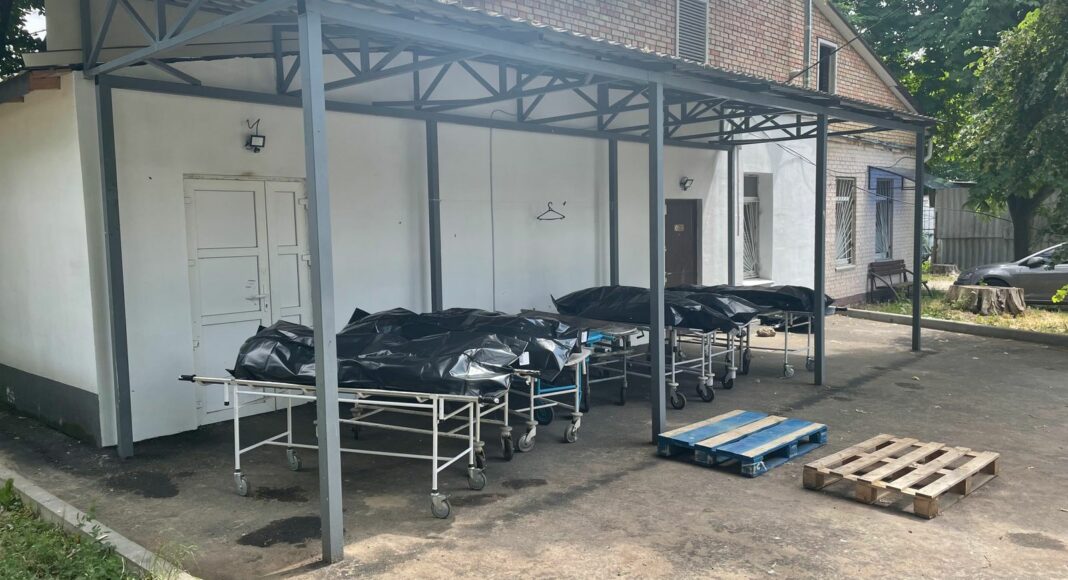We could smell the bodies before we saw them.
As we circled the mortuary towards the entrance, the smell became overpowering.
Then we realised why.
War ‘turning in Russia’s favour’ – live Ukraine updates
In the afternoon sunshine, a row of bodies lay in black bags. There was clearly no room for them anywhere else.
And it was clear by the stench these people had been dead for some time.
Warning: This article contains detail some may find distressing.
As we were absorbing the scene, I was struck by the contrast in our reaction to those who lived here. Locals walked past without a second glance. Even the smell didn’t seem to raise an eyebrow.
It’s perhaps little wonder. Death has been part of daily lives here for months in Bucha, the Kyiv suburb now known the world over for the atrocities that happened here.
When Russian forces withdrew from Bucha in April, the stories of killings, rape, and abuse of civilians that emerged shocked the international community.
Daily life has now resumed here – but the ordinary and the extraordinary exist side by side.
There’s birdsong. The sound of children on their way to the park. They scooter through streets peppered with bullet holes, just metres from the site of a former mass grave.
Read more: NATO to increase forces on high alert to over 300,000Zelenskyy wants war over by winter before conditions make fightback difficult
Bodies brought hundreds of miles as mortuaries overwhelmed
But Sky News learns the bodies lying outside Bucha’s mortuary aren’t people who were killed here.
They’ve arrived from Mariupol – 500 miles away – another place now synonymous with the horrors of this war. The grim coincidence isn’t lost on me. These bodies are just a tiny fraction of the thousands of people who are estimated to have died in the city.
I speak to a mortuary worker who is wheeling the bodies in and out. He tells me they are all from the Azovstal steel works – the final part of the city to fall to the Russians after a siege that lasted months.
I ask him if they are all fighters. “It looks like it. They look like military,” he replies.
Ukraine is struggling to cope with the number of dead – the Azovstal steel plant fell in May, so it’s taken more than a month for these bodies to reach this point.
They’ve been brought to Bucha to help relieve other mortuaries that are overwhelmed.
We were invited in to the post-mortem examinations. Nothing prepared us for what we would see.
The room was tense and busy. Six forensic pathologists in hazmat suits and gas masks were pulling the bodies apart and studying them, while a prosecutor and police representative collected eence.
Read more:Drones to space: 13 lessons the military is learningThe disappearing ships: Russia’s great grain plunder
Image:
The remains of the Azovstal iron and steel works in Mariupol
Impossible to make out victims’ faces
The smell was unbearable. The two bodies being examined were completely decomposed from head to toe.
It was impossible to make out their faces, but their bodies appeared to be that of young men.
A pile of blood-soaked clothing lay in the corner. Part of a skull lay near me at the end of one of the tables.
One pathologist was probing open wounds with his gloved hand, pulling out pieces of shrapnel. Wire was used to assess bullet entry and exit points.
An instrument not dissimilar to a bread knife was pulled out to cut into one of the bodies.
I felt a sense of guilt that I knew nothing about who these people were. Their names, what they looked like, who loved them, if they’d been scared.
‘I’m looking for my brother’
Outside the mortuary, I encountered the opposite problem – a woman who knew everything about someone who’d died but couldn’t find their body.
Nadiia Danylenko was waiting to speak to anyone who worked at the mortuary, clutching a photo. It feels like a desperate last resort.
“I’m looking for my brother, I was informed to ask you,” she says to a mortuary worker.
“We are not looking for missing people, the police do this,” he says, seemingly killing any hope she has of finding him.
Subscribe to the Ukraine War Diaries on Apple Podcasts, Google Podcasts, Spotify and Spreaker
Through tears, she explains her brother was killed on his balcony in Bucha in March and lay there for three to four days before being taken away by the Ukrainian army.
She’s been looking for him ever since. She left in tears holding his photo.
There is such a wretched indignity to all this: a family member desperately seeking her brother’s body, and unidentified bodies, hundreds of miles from where they died, whose family members likely have no idea they are here.




